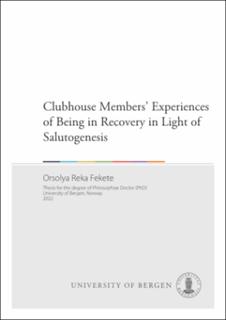Clubhouse Members’ Experiences of Being in Recovery in Light of Salutogenesis
Doctoral thesis

Åpne
Permanent lenke
https://hdl.handle.net/11250/2981239Utgivelsesdato
2022-02-25Metadata
Vis full innførselSamlinger
Sammendrag
Background: Mental illness is the leading cause of years lived with disability and a wide range of socioeconomic problems globally and in Norway. Addressing the challenges caused by mental illness, the Clubhouse programme offers lifelong membership as a voluntary participant in a working community for people with a history of mental illness. Despite its long history, there are several knowledge gaps regarding the Clubhouse programme. According to the literature, a comprehensive theoretical framework is lacking. There is little evidence of the active ingredients of the recovery process in the Clubhouse programme. Likewise, there is little knowledge on how individuals with mental illness experience being a member, and recovery in the Clubhouse programme, in a Norwegian context.
Aims: Thus, the main aim of this PhD project was to explore and develop a theoretical and empirical understanding of the usefulness of the Clubhouse programme. Based on three research questions: “1. How can the Clubhouse programme be understood in the light of salutogenesis?”, “2. What is it like to be a Clubhouse member?” and “3. What do members experience as helpful for their vocational and social recovery and processes of change within the context of the Clubhouse programme?”
Methods: To investigate the theory of salutogenesis as a theoretical framework for the Clubhouse programme, a systematic theoretical elaboration of salutogenesis compared to the Clubhouse programme was applied. The second and third empirical studies followed a hermeneutic-phenomenological design. A total of eighteen semi-structured interviews were conducted with members of three Norwegian Clubhouses. Systematic text condensation was used in the analysis of the empirical studies.
Findings: The first study's findings suggest that the salutogenic orientation is consistent with the philosophy of the Clubhouse programme, and salutogenesis might be a promising theoretical framework for the Clubhouse programme. The programme’s structured design might enhance comprehensibility, the Clubhouse community might foster manageability, and positive emotional bonds can strengthen meaningfulness. In addition, the different opportunities and services available within the Clubhouse programme can be understood as GRRs.
The second study identified three main themes: “Finally, I belong somewhere I can be proud of,” “I feel more like an ordinary citizen, just different,” and “I feel somewhat equal to others.” The themes suggested that being a Clubhouse member might contribute to members’ recoveries by enhancing their sense of meaningfulness.
The third study identified three main themes: “Balancing unlimited support with meeting challenges”, “Learning how to build new skills and roles in the community”, and “Getting better through and for work”. Participants experienced improved mental and social well-being and work readiness. Incorporating health-promoting challenge into the Clubhouse programme might enhance members’ recovery processes.
Conclusion: The theory of salutogenesis might shed light on the active processes within the Clubhouse programme. Furthermore, the results of this project suggest that overall, being a Clubhouse member is a positive experience, where members go through social and vocational improvement. However, several issues might thwart members' recovery processes, most of which could be addressed by incorporating the salutogenic concept of challenge in the programme practice on several levels, for example, task difficulty and follow-up. Further studies are needed on the applicability of salutogenesis as a theoretical framework and processes of change in the Clubhouse programme from a longitudinal perspective.
Består av
Article 1: Fekete, O.R; Larsen, T.M.B.; Kinn, L.G.; Langeland, E. (2020) Salutogenesis as a theoretical framework for psychosocial rehabilitation: The case of the Clubhouse programme. International Journal of Qualitative Studies on Health and Wellbeing 15(1), 1748942. The article is available at: https://hdl.handle.net/11250/2732646Article 2: Fekete, O.R; Langeland, E.; Larsen, T.M.B.; Kinn, L.G. (2020) “Finally, I Belong Somewhere I can be proud of” – Experiences of Being a Clubhouse Member in Norway. International Journal of Qualitative Studies on Health and Well-being 15(1), 1703884. The article is available at: https://hdl.handle.net/1956/21533
Article 3: Orsolya Reka Fekete, Eva Langeland, Torill M. B. Larsen, Larry Davidson & Liv Grethe Kinn (2021) Recovery at the Clubhouse: challenge, responsibility and growing into a role. International Journal of Qualitative Studies on Health and Well-being, 16(1), 1938957. The article is available at: https://hdl.handle.net/11250/2783900
